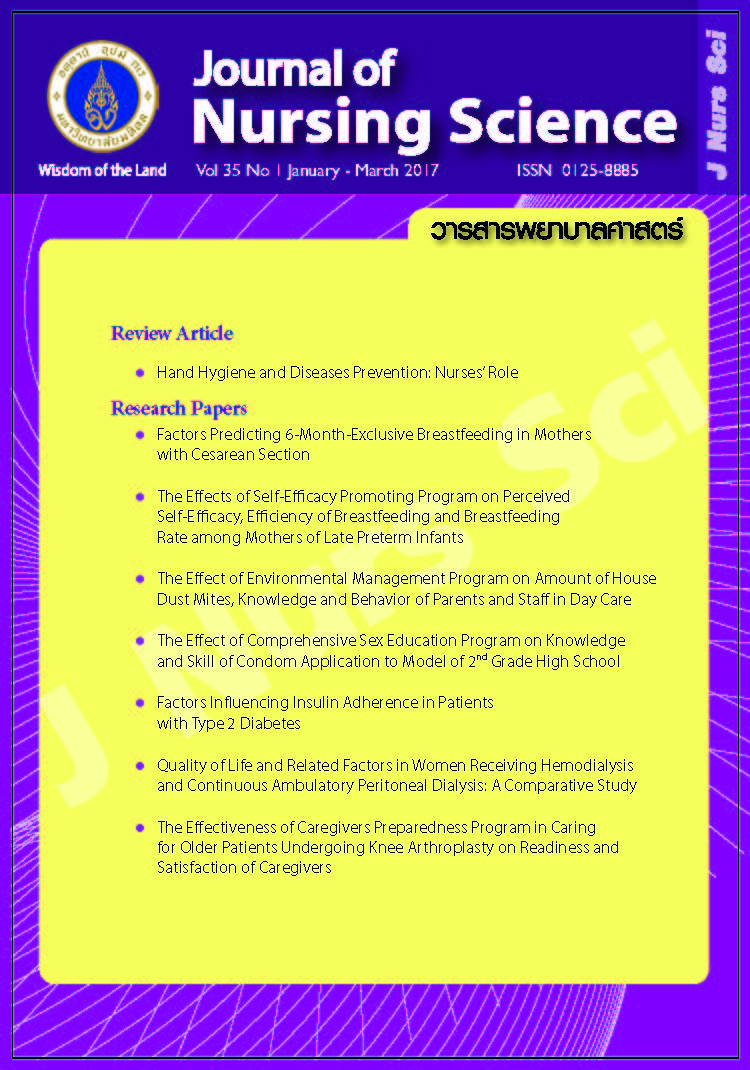Factors Influencing Insulin Adherence in Patients with Type 2 Diabetes
Main Article Content
Abstract
Abstract
Purpose: This study aimed to determine the predictive power of depression, financial status, attitude toward insulin treatment and patient-provider relationships on insulin adherence.
Design: Predictive research design.
Methods: The sample consisted of 120 patients with type 2 diabetes at the Outpatient Depart ment of one university hospital in Bangkok, Thailand. Data were collected by using personal data questionnaire, Center for Epidemiological Studies Depression Scale, the Insulin Treatment Appraisal Scale, Trust in Physician Scale and the Medication Adherence Report Scale. Data were analyzed using descriptive statistics and logistic regression analysis.
Main findings: The findings revealed that the sample were female (54.2%) with a mean age of 61.16 years (SD = 8.79, Max = 81, Min = 37) and had insulin adherence at 35.8 percent. Depression, financial status, attitude toward insulin treatment and patient-provider relationships were accounted for 19.5% in insulin adherence in patients with type 2 diabetes (Nagelkerke R2 = .195). Depression and attitude toward insulin treatment significantly predict insulin adherence (OR = .91, p < .05 and OR = .94, p < .05, respectively).
Conclusion and recommendations: Nurses should identify symptoms of depression in order to prevent depression in patients with diabetes and provide appropriate nursing care. Moreover, multidisciplinary team should deal with the negative attitudes of insulin therapy. Offering patients with knowledge of diabetes and understanding of insulin benefits and effectiveness can develop a positive perspective of insulin therapy.
ปัจจัยที่มีอิทธิพลต่อความร่วมมือในการใช้ยาฉีดอินซูลินในผู้ป่วยเบาหวานชนิดที่ 2
บทคัดย่อ
วัตถุประสงค์: เพื่อศึกษาอิทธิพลของปัจจัยด้านภาวะซึมเศร้า สถานภาพทางการเงิน ทัศนคติต่อการใช้ยาอินซูลิน และสัมพันธภาพระหว่างผู้ป่วยและบุคลากรทางสุขภาพ ในการร่วมกันทำนายความร่วมมือในการใช้ยาฉีดอินซูลีนในผู้ป่วยโรคเบาหวานชนิดที่ 2
รูปแบบการวิจัย: การวิจัยเชิงวิเคราะห์อำนาจทำนาย
วิธีดำเนินการวิจัย: กลุ่มตัวอย่างเป็นผู้ป่วยเบาหวานชนิดที่ 2 จำนวน 120 ราย ที่มาตรวจรักษา ณ แผนกผู้ป่วยนอก โรงพยาบาลมหาวิทยาลัยแห่งหนึ่งในกรุงเทพมหานคร เก็บรวบรวมข้อมูล โดยใช้แบบสอบถามส่วนบุคคล แบบประเมินภาวะซึมเศร้า แบบประเมินการรักษาโดยใช้ยาอินซูลิน แบบประเมินความไว้วางใจในบุคลากรทางสุขภาพ และแบบประเมินความร่วมมือในการใช้ยาฉีดอินซูลิน วิเคราะห์ข้อมูลโดยใช้สถิติเชิงพรรณนา และการวิเคราะห์ถดถอยโลจิสติค
ผลการวิจัย: กลุ่มตัวอย่างเป็นเพศหญิงมากที่สุด ร้อยละ 54.2 อายุเฉลี่ย 61.16 ปี (SD = 8.79, Max = 81, Min = 37) มีความร่วมมือในการใช้ยาฉีดอินซูลิน ร้อยละ 35.8 ภาวะซึมเศร้า สถานภาพทางการเงิน ทัศนคติต่อการใช้ยาอินซูลิน และสัมพันธภาพระหว่างผู้ป่วยและบุคลากรทางสุขภาพสามารถร่วมกันทำนายความร่วมมือในการใช้ยาฉีดอินซูลินในผู้ป่วยโรคเบาหวานชนิดที่ 2 ได้ร้อยละ 19.5 (Nagelkerke R2 = .195) โดยภาวะซึมเศร้าและทัศนคติต่อการใช้ยาอินซูลินสามารถทำนายความร่วมมือในการใช้ยาอย่างมีนัยสำคัญทางสถิติ (OR = .91, p < .05 และ OR = .94, p < .05 ตามลำดับ)
สรุปและข้อเสนอแนะ: พยาบาลควรประเมินภาวะซึมเศร้าเพื่อเป็นแนวทางในการป้องกันการเกิดภาวะซึมเศร้า และให้การพยาบาล และทีมสหสาขาวิชาชีพควรมีการจัดการกับทัศนคติด้านลบต่อการรักษาด้วยอินซูลิน โดยอธิบายให้ผู้ป่วยมีความเข้าใจเกี่ยวกับการดำเนินการโรคเบาหวานและประโยชน์จากการรักษาตัวด้วยอินซูลินเพื่อให้เกิดทัศนะคติที่ดีต่อการรักษาด้วยยาอินซูลิน
คำสำคัญ: โรคเบาหวานชนิดที่ 2 ความร่วมมือในการใช้ยาฉีดอินซูลิน ภาวะซึมเศร้า ทัศนคติ สัมพันธภาพระหว่างผู้ป่วยและบุคลากรทางสุขภาพ
Article Details
Copyright Notice: Nursing Science Journal of Thailand has exclusive rights to publish and distribute the manuscript and all contents therein. Without the journal’s permission, the dissemination of the manuscript in another journal or online, and the reproduction of the manuscript for non-educational purpose are prohibited.

Disclaimer: The opinion expressed and figures provided in this journal, NSJT, are the sole responsibility of the authors. The editorial board bears no responsibility in this regard.


